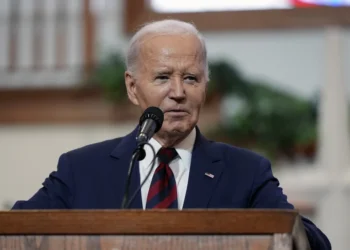Poland ensured sovereigntist forces went one-for-two in this spring’s transformative presidential elections in Central and Eastern Europe on June 1. Two weeks after the European liberal establishment finalized its power-grab in Romania, conservative historian Karol Nawrocki secured a razor-thin victory over liberal Warsaw Mayor Rafał Trzaskowski.
In fact, Nawrocki snatched victory from the jaws of defeat. Exit polls released at poll-closing time suggested a narrow victory for Trzaskowski. In the early morning hours, after all votes were tabulated, the outcome flipped.
In the short term, the result maintains the status quo in Polish government. Nawrocki will replace two-term President Andrzej Duda, another conservative. As president, Nawrocki will provide the crucial counterweight to a parliamentary coalition of leftist, liberal, and centrist forces under Prime Minister Donald Tusk, the former European Council President and EU dignitary.
Polish President Can Veto Leftist Agenda
The Polish president primarily undertakes foreign visits and presides over state events, but the role also carries a critical legislative veto. If Nawrocki exercises this veto, Tusk’s coalition will need to muster an overriding supermajority — something it is unlikely to achieve.
This is crucial on the issue of abortion, which has been a near-obsession of the Tusk government since he took office in late 2023. Tusk made abortion support a criterion for his party list during the elections that year. An abortion-liberalization bill narrowly failed in the Sejm last year (Duda certainly would have vetoed it), but the government vowed to try again this year. The (illegal) abortion performed for a nine-month pregnant woman this spring highlighted the tipping-point nature of this campaign. Without the barrier of a presidential veto, Tusk likely would have found the votes on the second attempt.
The Tusk government has also supported the legalization same-sex unions and a European-style “hate-speech” law that would criminalize, among other things, promotion of Catholic social teachings on topics like marriage and sexuality. Neither effort has any real short-term legislative prospects after Nawrocki’s election, although the European Union’s own draconian “hate-speech” legislation is another matter.
Migration has recently become a major topic in Polish politics — something that would have been unthinkable a short time ago. Migrants are arriving from left, right, and center, as Germany conducts “push-backs” in the West, Belarus and NGO groups scheme in the East, and the government imports unskilled workers to populate the service sector. Tusk and Trzaskowski sought to downplay this issue until after the presidential election. According to a report in Le Monde, the European Union also sat quietly to aid the Warsaw mayor. Now any forced implementation of EU migrant relocation schemes will contravene both a deeply anti-migration populace and an uncooperative president.
Tusk Tried to Censor, But People Have Had Enough
The Tusk government has also been busy beyond the halls of the Sejm. Insisting on the need for “militant democracy” after eight years of governments under the conservative Law and Justice (PiS) party, the Tusk government has arrested political opponents, attacked conservative media, disregarded inconvenient courts and judges, and stripped opponents of election funding.
Now, having lost the critical presidential election and facing a suddenly hostile Washington, the government camp will face a greater challenge in gaining the consent of the people. A defensive government must now hold together its coalition and avoid snap elections.
Much Polish media analysis has focused on how the government will weather the next two years. Apart from that, several political certainties have characterized this election. Polish society is deeply divided along socioeconomic lines, familiar throughout the West. The political gender gap is dramatic. The divide between the country’s historical core and the “Recovered Territories” of the North and West, which were often German lands before 1945, continues to linger.
Trzaskowski Loses Again
The most fascinating takeaway is this: Poles have twice rejected Rafał Trzaskowski, the man with impeccable liberal ruling-class credentials and seemingly limitless institutional support (he lost to Duda in the 2020 presidential race).
During this year’s race, Nawrocki contended that his opponent came from a laboratory — an assertion that is difficult to argue. Trzaskowski’s education spanned several continents and included a stint at Oxford. Visitors in recent years have included Britain’s Prince William, France’s President Emmanuel Macron, and former President Joe Biden. Alex Soros has gushed over Warsaw’s “impressive” and “charismatic” mayor in various photo ops. Western media have fawned over him for a decade.
“Too Nice for Poland?” asked a recent editorial in Germany’s Die Zeit. “Rafał Trzaskowski wants to become president. His problem: he is urbane and speaks five languages. That could cost him the victory.” Unsubtle German backing and pedantry — a habit of unnecessarily inserting foreign words into everyday speech earned Trzaskowski the derisory nickname Bążur (Bonjour) — were indeed frequent talking points in the Nawrocki camp.
People Dislike the “Logical Option” of Trzaskowski
As the campaign neared its conclusion and inflated poll numbers lost credibility, Trzaskowski seemed frustrated that the Polish electorate didn’t buy the western managerial class’s universal adulation.
“In recent weeks, he gives the impression of an exhausted, offended narcissist, frustrated that he has any opponents in this race, that anyone dares to ask him any uncomfortable questions,” wrote conservative journalist Marek Pyza in late April.
Days before the election’s first round, a popular Polish blogger and social-media personality offered a superior analysis to that of the political pundits: “It looks like Rafał Trzaskowski will do the impossible and lose the election. Not because he stumbled . . . He will lose because Poles have one wonderful characteristic: they hate when someone forces something on them. Whether it is politics, margarine, or the Green Deal. Nobody in [Trzaskowski’s party, Civic] Platform understands this.”
This is useful wisdom for analyzing, not just this election outcome, but where Poland goes from here.
Michael O’Shea is an American-Polish writer and translator. He is a Danube Institute Visiting International Fellow.

















